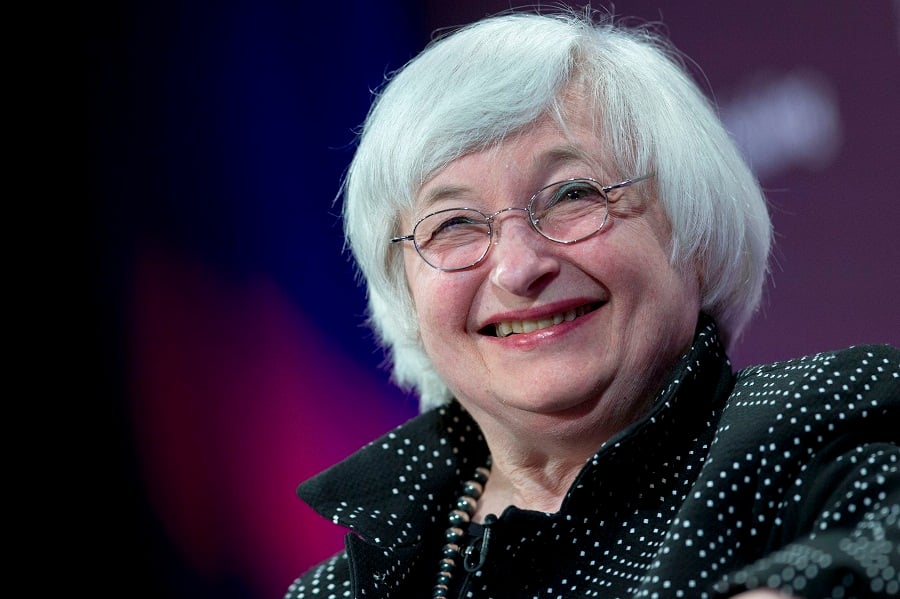Federal Reserve Chair Janet Yellen said she still expects to raise interest rates this year if the economy meets her forecasts, with a gradual pace of tightening to follow.
While the labor market is nearing full strength, “we are not there yet,” she said Friday in a speech in Providence, R.I.
“If the economy continues to improve as I expect, I think it will be appropriate at some point this year to take the initial step to raise the federal funds rate,” she said.
Even after the first rate increase since 2006, “I anticipate that the pace of normalization is likely to be gradual,” Ms. Yellen, 68, said.
Echoing the Fed's April statement, Ms. Yellen said she expects the economy to return to a “moderate” pace of growth after a disappointing first quarter as headwinds including a cooling global economy gradually abate.
(More: The bear market in bonds has arrived)
“It's clearly going to be one of the most dovish tightenings you'll ever see, when it comes, because the Fed wants to make clear they'll still be very accommodative,” said Dana Saporta, U.S. economist at Credit Suisse Group AG in New York.
U.S. stocks erased losses following Ms. Yellen's remarks, with the S&P 500 Index rising less than 0.1% to 2,131.22 as of 1:46 p.m. in New York. The yield on the benchmark 10-year Treasury note was up two basis points, or 0.20 percentage point, or 0.02 percentage point, to 2.21%.
Ms. Yellen repeated that policy isn't on a pre-set course and the Fed may tighten more quickly if the economy performs better than expected or raise rates at a slower pace if it disappoints. Delaying the first rate increase until employment and inflation return to the Fed's objectives “would risk overheating the economy,” Ms. Yellen said.
FED'S CRITERIA
She also repeated the Fed's two criteria for raising rates, which have been kept near zero since December 2008: “I will need to see continued improvement in labor market conditions, and I will need to be reasonably confident that inflation will move back to 2% over the medium term.”
Policy makers expect growth to pick up after stalling in the first quarter, even as they fret about the strength of the consumer spending that makes up two-thirds of the economy, minutes of their April meeting released Wednesday show.
Ms. Yellen said it will be best to proceed “cautiously,” which means taking “several years” before policy makers lift the federal funds back to its normal, longer-run level.
Even after significant employment gains, the labor market “is approaching its full strength,” though still short of it, Ms. Yellen said. While the U.S. is nearing what many economists say is full employment, the jobless rate “probably does not fully capture the extent of slack in the labor market,” she said.
GROWTH SEEN
Still, Ms. Yellen said the U.S. “seems well positioned for continued growth” as consumers benefit from cheaper gas prices that amounts to a “sizable boost in household purchasing power” estimated to be about $700 per household on average.
Ms. Yellen listed three specific “headwinds” that are restraining growth. She said some of the effects are fading while others are still present.
She said she expects the drag from low house prices and tight mortgage credit to “continue to fade.” With tax revenues alleviating budget constraints at state and local governments, that headwind “is mostly behind us,” she said. Finally, “weak growth abroad” has dented U.S. exports.
“This headwind too should abate as growth in the global economy firms, supported by monetary policies that generally remain highly accommodative,” Ms. Yellen said.
While most policy makers forecast in March that they expected to raise interest rates this year, the April minutes showed that they “thought it unlikely” they would act at their next meeting on June 16-17.
(More: Bond ETFs' resiliency surprises many investors)
Weak growth overseas, which has helped to push up the value of the dollar against the currencies of American trading partners, has “dented U.S. exports and weighed on our economy,” Ms. Yellen said Friday, adding that “this headwind too should abate as growth in the global economy firms.”
Ms. Yellen noted that home prices are recovering and said population growth is creating a need for more housing. Nevertheless, she said, credit remains tight for some would-be homeowners and “activity in the housing sector is likely to improve only gradually.”
Consumer prices as measured by the Fed's preferred gauge rose 0.3% in March from a year earlier and have been below the Fed's goal since April 2012. Another measure of price pressures released on Friday showed that the cost of living excluding food and energy rose 1.8% in April from a year earlier.
LABOR MARKET
The labor market continues to heal unevenly. Employers added 223,000 workers in April after a March slump that was worse than initially estimated. The jobless rate fell to 5.4%, the lowest since mid-2008, while underemployment remained elevated at 10.8%, down from 10.9%.
Ms. Yellen spoke to the Greater Providence Chamber of Commerce. Senator Jack Reed, a Democrat from Rhode Island, helped facilitate her appearance before the group, according to his spokesman Chip Unruh, and Laurie White, the chamber president.
Mr. Reed has introduced a bill to require the head of the New York Fed be appointed by the U.S. president and confirmed by the Senate. Republican Senate Banking Committee Chairman Richard Shelby of Alabama has incorporated Mr. Reed's proposal in his own bill for a broader overhaul of financial regulation. Republicans on the panel approved the bill Thursday on a party-line vote.







